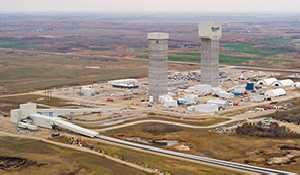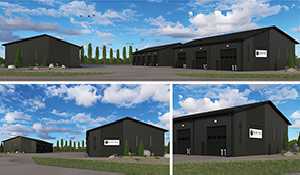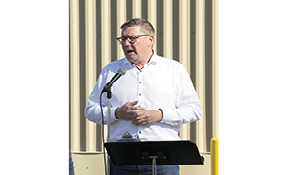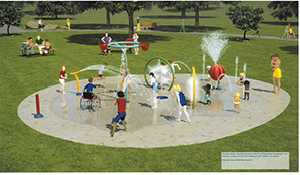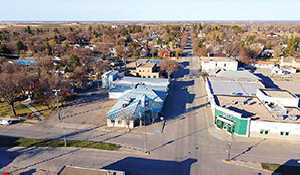Saskatchewan leaning towards first dose strategy for COVID-19 vaccine
All Saskatchewan residents may have opportunity to be vaccinated by end of June
March 3, 2021, 10:05 am
Brian Zinchuk, Local Journalism Initiative reporter
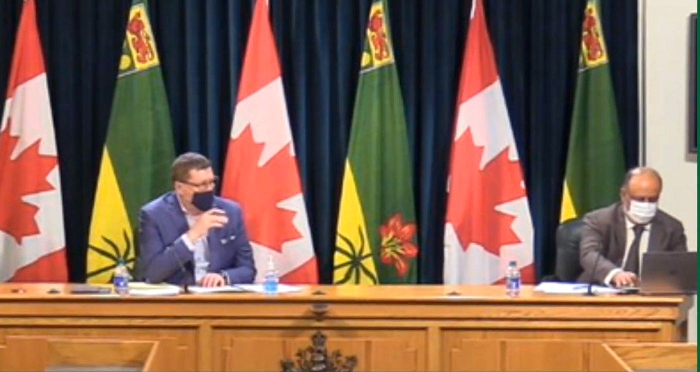

The Government of Saskatchewan is clearly leaning towards a first-dose COVID-19 vaccination strategy, getting as many people vaccinated with their initial dose as possible, before following up with a booster shot much later to maximize immunity.
Doing so would maximize the number of people immunized as quickly as possible, allowing nearly all Saskatchewan residents to receive their first shot by June and allowing things to begin to return to normal. However, that would mean stretching the period between doses from the three or four weeks, as they are supposed to be administered, to as much as four months.
Premier Scott Moe and Chief Medical Officer Dr. Saqib Shahab referenced this strategy numerous times during the regular COVID-19 briefing held at the Legislature on March 2.
Shahab pointed to “great information from the (United Kingdom), from Quebec, from (British Columbia), on how effective one dose is for as long as four months.”
He expects future recommendations from partners, including the federal government, to support delaying the second dose up to four months.
“And what that will do is that will really accelerate our first dose program, and if you're able to do that, we can see most of our population 18 and older, potentially getting your first dose by June,” Shahab said. “And I think that would really help us in really putting the pandemic behind us. And like the premier said, I think we all need to then … be ready to take any vaccine that is available, when our age cohort comes up in the sequencing.”
Shahab posed the question of how you can maximize the population benefit with a known supply of vaccines. He said, “The way we can maximize that is giving one dose to the vast majority of people by June, and then completing the second doses July onwards. And this will help us prevent a potentially devastating, variant fueled, third wave.
“And we'll also maximize population-level protection, at no sacrifice to individual protection, because that is critical as well. Right now, the aim is clinical protection, which means hospitalization, death, at a clinical individual level, but as more and more people get vaccinated, you know, obviously we want to see the population impact of that as well, that kind of community immunity impacts. And the most efficient way to get that, based on strong scientific advice, is to give everyone one dose.”
Moe said a four-month interval between first and second doses would mean virtually all Saskatchewan residents could be provided with their first dose of either Pfizer or Moderna vaccines by the end of June. If you add AstraZeneca and perhaps Johnson & Johnson vaccines (the second has not yet been approved in Canada, but has been approved in the United States), Moe said, “Then we're starting to look at something in early June, where we could have everyone in the province provided with the opportunity to receive their first dose of vaccine.”
“Understanding the efficacy of that first dose, and some of the data that is coming in, and continues to come in, and the protection that it provides, this really is a game changer for the dates that we can really strongly have some serious discussions about the measures that we have in place and what that looks like, over the course of the next number of weeks as opposed to having that conversation over the course of the next number of months,” Moe said.
Oldest first
Key to this first dose strategy is getting the oldest people in Saskatchewan vaccinated first, which the Province has already been working on. To that end, Moe announced that first doses have been delivered to every long-term care facility in Saskatchewan, and 91 per cent of their residents had been vaccinated. The remaining nine per cent either refused or were unable to take if at this time. A further 53 per cent of those long-term care residents had received their second shot and are now considered fully vaccinated.
Moe called it an important milestone along the way to the pandemic being over.
“We've also delivered vaccines to 90 per cent of the personal care homes in the province. About 78 per cent of the residents have received their first dose of the vaccine, and about 43 per cent have now received both shots,” Moe added.
The province is expected to receive about 112,000 vaccines Pfizer and Moderna in the month of March, and a further 15,000 doses of the newly-approved AstraZeneca vaccine next week. That vaccine, which is approved for ages from 18 to 64, will likely be used for that age group, although Shahab pointed out that one should accept whatever vaccine is available when it is their turn, and that the United Kingdom has been using it for people 65 and older with success. However, by the time Saskatchewan gets larger volumes of the AstraZeneca vaccine, most of its population 65 and older should have already been vaccinated with the other vaccines.
Moe said Saskatchewan has been leading the nation in getting shots in arms, with over 100 per cent of doses received having been administered, as compared to 86 per cent for the next leading province. He said there is very little wastage.
Appointments
Moe said appointments for vaccination will be soon available online or by telephone, meaning eligible residents over 70 years of age will soon be able to book appointments.
“We expect to launch that appointment system next week, so for everyone who is waiting to get your shot, and is in the Phase 1 category, we are working to get you vaccinated as quickly as possible.”
Moe said case numbers and hospitalization numbers continue to stabilize, with the seven-day average of new cases now 144, down 55 per cent from our peak in January. Hospitalizations are around 154, down from a high of 238.
Vaccinations of elderly residents should lead to a continued decline in serious cases and hospitalizations, Moe said, noting, “The truth is that the vaccines are working. They are reducing transmission. They are reducing serious outcomes. And that's very encouraging for all of us.”
Relaxation of measures
Moe noted that many people have asked for a relaxation in current public health measures, in particular those limiting household gatherings. He said, “I would say to this is we're very close to making, and finalizing, these decisions. I've spoken to Dr. Shahab about this frequently. He just wants to see the new case and hospitalization numbers remain stable for a few more days. If that occurs, we should have more to say about household restrictions, possibly by early next week. We'll be taking a close look at all of the other public health orders that are set to expire on March, the 19th.
“So I'm asking everyone in this province to hang tight for just a few more days. The next number of weeks, not months, we're going to start to see things change, and change significantly. Spring is coming. Vaccines are on the way. We are on the path to getting life back to normal, as we know it, but we're just not quite there yet. So please, the next number of days and weeks keep doing what you're doing to keep yourself safe to keep those around you safe and to keep your family safe.”
Moe added, “When it is your turn, and when you are offered a vaccine, there is only one answer that should come out of your mouth and that is ‘Yes.’
“They're all equally effective, the vaccines that are that are available, and a vaccine in our arm is far better than a vaccine that's sitting on the shelf, or not being administered to someone here in the province,” Moe said.



























